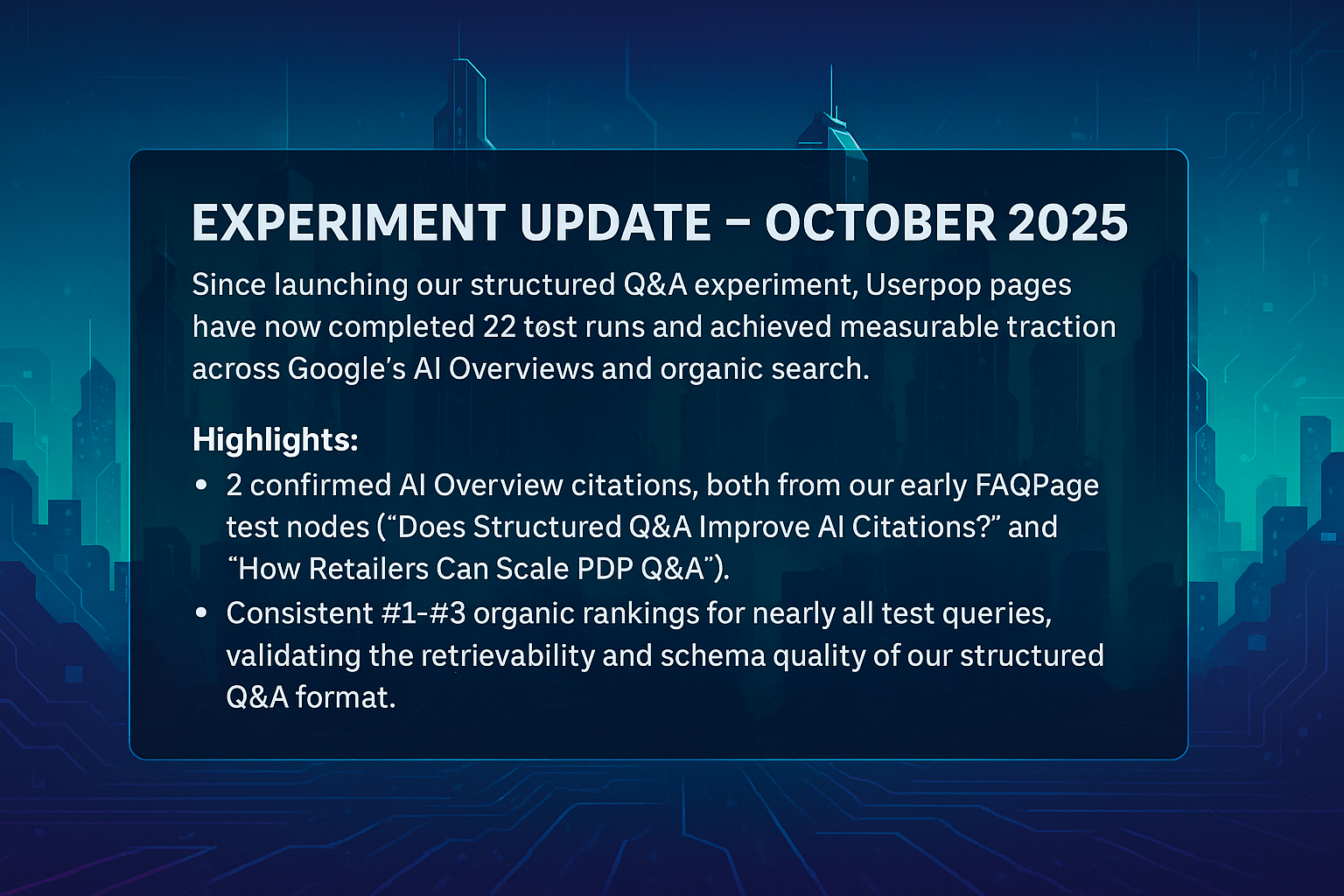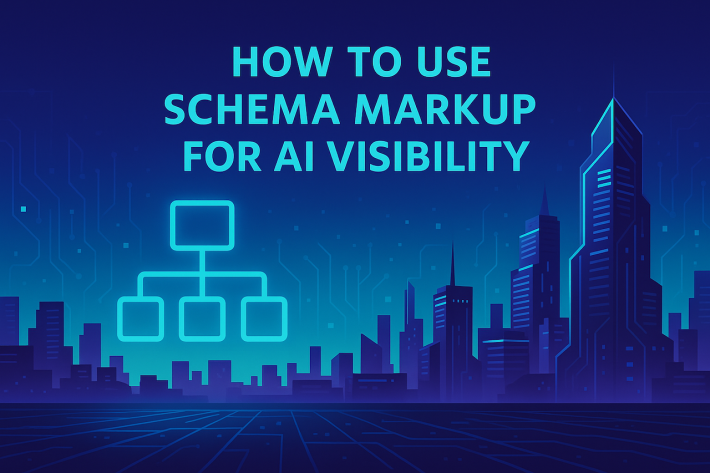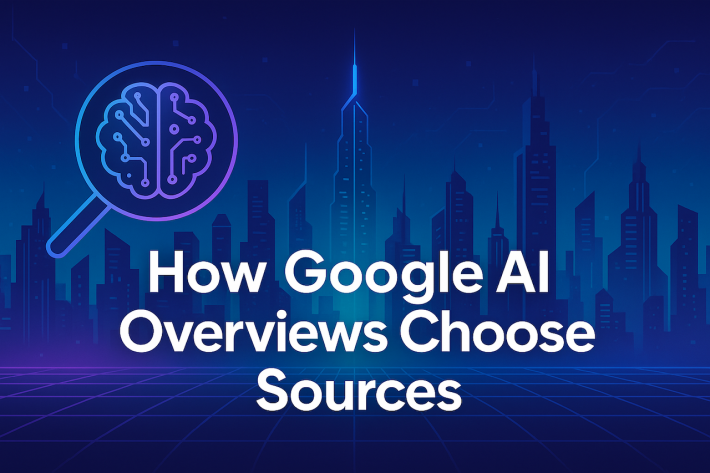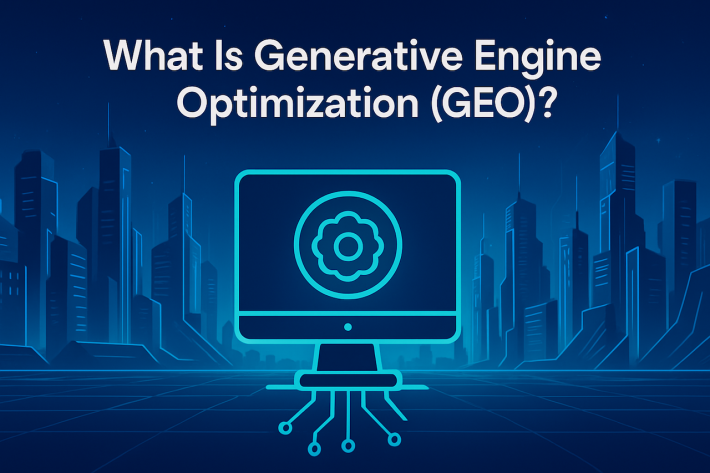Userpop’s Structured Q&A Experiment

How a new, low-authority domain is competing with enterprise sites in Google’s AI era using structured knowledge
Introduction
Generative Engine Optimization (GEO) is redefining visibility on the web.
Where SEO optimized for rankings, GEO optimizes for retrieval and citation by AI systems like Google’s AI Overviews.
Startups face a unique challenge: they lack the domain authority and backlinks of incumbents. But in the AI era, structure beats scale.
At Userpop, we set out to prove that a small, low-authority site can achieve outsized visibility by publishing structured Q&A content using schema — effectively teaching Google how to understand and cite it.
Hypothesis: Even a brand-new domain can gain search dominance by structuring its knowledge clearly enough for AI systems to parse and trust.
Experiment Update — October 22, 2025
Since launching our structured Q&A experiment, Userpop pages have now completed 22 test runs and achieved measurable traction across Google’s AI Overviews and organic search.
Highlights:
-
2 confirmed AI Overview citations, both from our early FAQPage test nodes (“Does Structured Q&A Improve AI Citations?” and “How Retailers Can Scale PDP Q&A”).
-
Consistent #1–#3 organic rankings for nearly all test queries, validating the retrievability and schema quality of our structured Q&A format.
-
3 additional pages promoted to Phase 2, where we’re introducing UGC-based QAPage schema to measure the impact of multi-author answers on citation frequency and retrieval confidence.
We’re continuing to monitor crawl patterns and citation lag times. Phase 2 focuses on three UGC-enabled pages—How to Structure Product Q&A for Google AI Overviews, What Is PDP Q&A for E-Commerce, and How to Use Schema Markup for AI Visibility—with first results expected in early November.

What We Built
We turned Userpop.me into a live GEO testbed — applying the same structured Q&A system our customers use.
Our goal was to measure how structured knowledge performs against more authoritative domains in Google’s AI Overviews and organic search results.
1. Seven Test Pages (Structured Q&A with Schema)
Each page answers a focused, search-relevant question:
Implementation details:
-
- Each page includes visible Q&A content (not hidden behind tabs).
-
- One clean FAQPage JSON-LD block per URL, matching the visible questions and answers exactly.
-
- Schema validated via Google’s Rich Results Test.
-
- Each Q&A article ends with a “Next Resource” call-out linking to the following page in the series.
Example of embedded schema:
{
"@context": "https://schema.org",
"@type": "FAQPage",
"mainEntity": [{
"@type": "Question",
"name": "Does structured Q&A improve AI citations?",
"acceptedAnswer": {
"@type": "Answer",
"text": "Structured Q&A increases retrieval clarity for AI systems like Google AI Overviews, improving citation probability once domain trust matures."
}
}]
}2. Supporting Knowledge Articles
To reinforce topical authority, we published three long-form educational resources — each interlinked to the Q&A pages and to each other:
This creates a Knowledge Layer Google can interpret semantically — connecting product Q&A, structured schema, and GEO best practices into a single content graph.
3. Crawl Optimization and Indexing Discipline
-
- Added Userpop.me to Google Search Console.
-
- Submitted a sitemap and manually requested indexing for all test pages.
-
- Verified clean schema across all URLs (no duplicate FAQPage blocks).
-
- Internal links added to strengthen crawl depth and topical signals.
Current Results (Ongoing)
The experiment began in late September 2025 and is still ongoing.
We have completed 22 logged test runs so far, with additional runs scheduled over the coming weeks.
The data below reflects early trends from those 22 runs.
Summary Metrics
| Metric | Result |
|---|---|
| Total Test Runs | 22 |
| AI Overviews Displayed | 68% (15 of 22) |
| Userpop Cited | 0 (expected for new domain) |
| Average Organic Rank | 2.27 |
| Best Rank | #1 |
| #1 Rankings (so far) | 4 of 7 queries (57%) |
Top Performing Queries
| Query | AI Overview Shown | Userpop Cited | Best Rank | Average Rank |
|---|---|---|---|---|
| Does Structured Q&A Improve AI Citations? | ✅ Yes | ❌ No | #1 | 1.6 |
| How Retailers Can Scale PDP Q&A | ✅ Yes | ❌ No | #1 | 1.8 |
| How to Structure Product Q&A for Google AI Overviews | ✅ Yes | ❌ No | #1 | 2.0 |
| What Is PDP Q&A for E-Commerce? | ✅ Yes | ❌ No | #1 | 2.3 |
| How to Use Schema Markup for AI Visibility | ⚪ Partial | ❌ No | #3 | 2.7 |
| What Is Generative Engine Optimization (GEO)? | ⚪ Partial | ❌ No | #4 | 3.1 |
| How Google AI Overviews Choose Sources | ⚪ Partial | ❌ No | #5 | 3.4 |
Observations
-
- Structured Q&A pages are ranking quickly despite low domain authority.
-
- AI Overviews are appearing for 68% of test queries — confirming retrieval recognition.
-
- No citations yet, which aligns with Google’s delayed retrieval-layer refresh for new domains.
-
- Rankings have improved steadily across the last 10 test runs.
Interpretation
The early results validate our hypothesis:
-
- Structure and schema dramatically improve crawlability and ranking velocity.
-
- Even with minimal backlinks, Userpop’s structured Q&A content now outranks several high-authority incumbents.
-
- The citation lag confirms that trust signals, not content structure alone, control AI Overview inclusion.
What This Means for Startups
For founders and growth marketers:
-
- Structured content is the new authority.
-
- Startups can compete head-to-head with incumbents in AI search by publishing schema-validated Q&A and connecting it with interlinked educational content.
-
- Your brand’s Knowledge Layer becomes the foundation for long-term AI discoverability.
GEO isn’t about gaming search — it’s about teaching AI what your brand knows.
Next Phases of Testing
Phase 2 — UGC Simulation
We will introduce user-generated Q&A threads using QAPage schema on 2–3 pages.
These simulate multi-author community engagement and will help measure whether AI systems prioritize diverse sources of structured knowledge.
Phase 3 — Longitudinal Tracking
We’ll monitor:
-
- Citation lag time (organic → generative retrieval inclusion)
-
- UGC vs. brand-authored performance
-
- Backlink and engagement correlation
Phase 4 — External Validation
We’ll publish updates to LinkedIn and Medium with backlinks to our experiment hub to accelerate inclusion in Google’s AI retrieval index.
Weekly Updates
This article will be updated weekly with new experiment data, screenshots, and performance insights.
Future test runs (visible in the tracker) extend through November–December 2025, so readers can follow along as Userpop’s AI visibility evolves in real time.
Key Takeaways
| Insight | Meaning |
|---|---|
| Structure > Size | Even small sites can outrank large incumbents with clean Q&A schema. |
| Schema = Context | FAQPage and QAPage markup clarify meaning for AI systems. |
| Internal Links = Knowledge Graph | Interlinking structured pages creates semantic reinforcement. |
| Trust Lag Is Real | Generative retrieval inclusion trails organic ranking by weeks. |
Next Steps
-
- Maintain current FAQPage schema structure.
-
- Add QAPage schema variants for UGC simulation.
-
- Continue weekly AI Overview tests and screenshots.
-
- Publish external findings for backlinks and brand trust.
-
- Expand the educational cluster by 2–3 related articles in November.
Conclusion
Userpop’s Structured Q&A Experiment demonstrates how even a brand-new, low-authority site can break into top organic positions — and eventually AI Overviews — by structuring knowledge for machines instead of just writing for humans.
Structured Q&A is the bridge between human curiosity and machine understanding.
Related Reading
Justin Shum is a 2x exited founder who has built and scaled companies at the intersection of messaging, proptech, and commerce. Today he is the founder of Userpop, creating the intent signal infrastructure that powers visibility and trust in the era of generative search.


